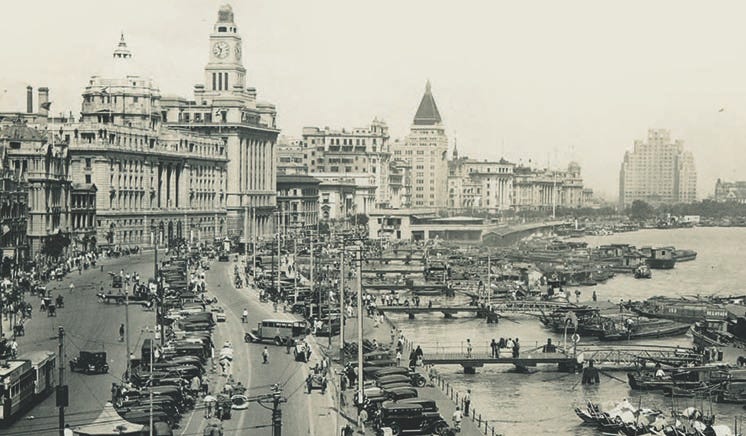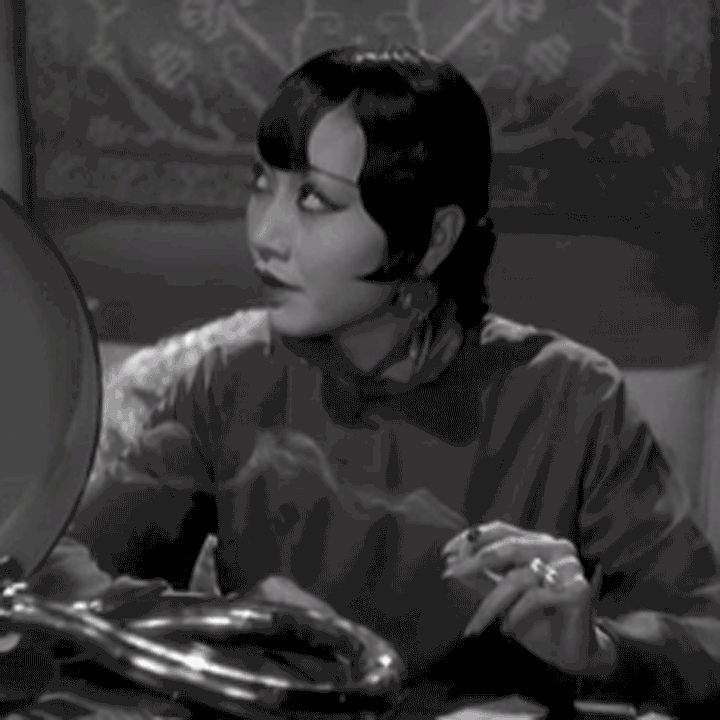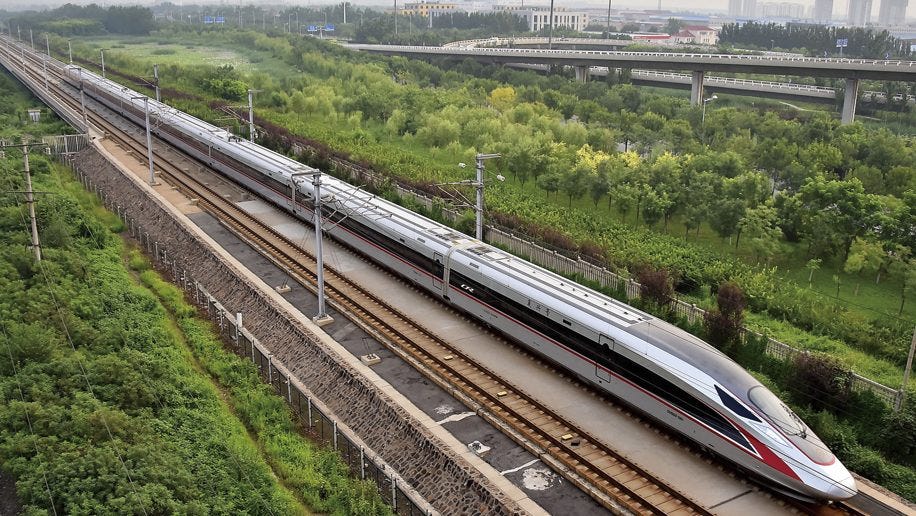Gross is every year’s top-grossing movie, since 1913, reviewed.
SHANGHAI EXPRESS, JOSEF VON STERNBERG, PARAMOUNT PICTURES, 1932, 78 MINUTES.
It’s about 750 miles from Beijing (Peking in the movie) to Shanghai. These days it takes a bit more than four hours on the world’s fastest passenger train. The express in 1932’s top-grossing film takes three days and, on this occasion, it arrives in Shanghai four hours late, which is not bad when you consider what happens along the way.
A beautiful and implausible love affair
In Shanghai Express, Marlene Dietrich, as Shanghai Lily, gives us the worldly, deadpan melancholy of an independent woman (“living by her wits”, somebody says), adrift at the edge of a collapsing empire, moving from city to city with a trunk full of gorgeous eveningwear - and a matching veil for each outfit. She runs into her ex-boyfriend, military surgeon Captain Donald “Doc” Harvey - one of the British Empire’s leading blocks of wood - on the train. Doc is played by chiseled Islington boy Clive Brook who manages to express moderately schmaltzy Hollywood passion but in the frozen, cut-glass tones of the officer class. We learn that they’d split up some years before in circumstances we’re not told about. On the train their love is rekindled and, when things get intense, Lily confirms her undying loyalty to Doc by secretly agreeing to trade her own freedom for his.
Theirs is a charming, tactiturn double-act that ought to have spawned a whole series of films. I really want to know what happens after they get back together in Shanghai. The sequel ‘By Sea to Seattle: what “Doc” Harvey and Shanghai Lily Did Next’ would have been a blockbuster.
Revolution
We’re in the midst of the rolling civil war, the chaos that preceded the invasion of Manchuria and the long, brutal war with Japan. Government soldiers stop the Shanghai Express and arrest a man. At the next station, rebels seize the train and take our block of wood hostage. They want to exchange him for the arrested man - negotiations begin. The hostage situation is managed by Chang, a mixed-race rebel leader (“I’m not proud of my white blood”) played, in yellow-face, by Warner Oland, a Swedish actor you’ll know from four Fu Manchu and sixteen Charlie Chan movies. He’s been on the train, with the first class Europeans, incognito, and quick-changes into a rebel uniform. There are so many stars on his shoulders they spill down the arms of his tunic. He’s a big deal.
The rebels are a caricature of course, but not an unsympathetic one - there’s some light torture and they machine-gun a lot of nationalist soldiers in the dark but all the passengers get home in the end. We assume the rebels are Communists - they have clipboards and they’re fighting the government. Chang wants to take Lily back to his palace ‘in the interior’, though, which seems a bit more War Lord than Communist. There’s a real event, from very recent history, at the base of this. Director Josef von Sternberg has translated the bandits from that story into these non-specific ‘rebels’ and leaves us to assume they’re Communists. They’re the vaguely Middle-Eastern action movie baddies of their era.
If you’d gone to the cinema to see Shanghai Express in 1932 and you’d been able to look along the timeline eighty or ninety years, you’d have seen the direct descendents of these rebels building the world’s fastest passenger railway and the biggest export economy on earth (and your iPhone). You’d want to keep an eye on these guys.
Murder on the Orient Express
Packed into the first class coach are a dozen vivid characters, not a dud amongst them. Von Sternberg brings us the opportunists and parasites and lost souls who, the stories tell us, circulate in the entrepôts and gated compounds and spheres of influence of this era. It’s a very satisfying ensemble. This part is fun.
Shanghai Lily - real name Madeline - is assigned a cabin with a young woman, Hui Fei, who also, we guess, lives by her wits - played by laconic Chinese-American actor Anna May Wong (I wrote about her starring role in Piccadilly). The two women barely speak but they constitute the dynamic centre of the film. Together they rescue the European passengers from a nasty fate while those passengers wring their hands and pace up and down saying things like “but I’m a British subject, how dare you detain me!” At the critical moment Hui Fei silently kills rebel leader Chang. There’s a 20,000 reward, we learn (unspecified currency). Like I said, living by her wits. Doc returns to the train and it sets off for Shanghai again.
Also in the ensemble: The Reverend Carmichael, priggish theologian, who meets Shanghai Lily on boarding the train in Peking and immediately forms a low opinion of this ‘living by your wits’ business. When he learns about the sacrifice she was ready to make to save Doc, though, he makes a somewhat implausible moral u-turn and becomes her advocate, persuading the block of wood to take her back.
Sam Salt is a tragi-comic gambler in the Nicely-Nicely Johnson mould who wears much fabulous jewelry (all fake): "I bet on everything under the sun, going right or wrong.” This guy’s basically the Western powers, gambling on retaining control in the East - reckless, interested only in gain and then folding when the going gets tough.
Eric Baum, an opium dealer pretending to be in coal, is German and the only man to be tortured while held by the rebels. Chang makes sure Baum knows that he’s being branded with a hot poker not because of the opium but because of his insolence towards the incognito rebel in the first class corridor earlier in the journey. Right here, in the middle of the movie, a mixed-race rebel punishes a German for his racism. The worm has turned. Mrs Heggarty, a white-haired boarding house keeper apparently from an Ealing Comedy who may not be as prim as she seems. She hands out business cards: “Yorkshire pudding is my speciality.”
My absolute favourite secondary figure is sad French officer (and obvious Jacques Tati character) Major Lenard, played by Émile Chautard whose only line, throughout, is essentially “je ne comprends pas, je ne parle pas Anglais.” Incomprehension is his motif, he’s here because he doesn’t understand. Chautard is a veteran actor and directed over 100 films in his own right, though - casting him is evidently some kind of in-joke. It turns out his character has a story - he’s a fake soldier, having been kicked out of the army years before. Lily, translating for the Major in his interrogation by Chang, learns of his dishonour but keeps it to herself, saving him from embarassment. She understands. He is sweetly grateful. On parting he kisses her hand, wipes away a tear.
Humiliation

The Chinese call the long period of unequal treaties, exploitive leases and violent imperial intrusion that ended finally with the Communist takeover “the century of humiliation.” The Shanghai Express cuts across the territory of this humiliation and will arrive in its apex city, the location of the Shanghai International Settlement, an enclave seized after the British victory in the first opium war of 1839 and only finally taken back during world war two.
Dozens of ‘concessions’ and treaty ports were carved out of China in this period and they became home to a rich ecology of drifters, refugees, chancers, speculators and every category of exile from the West. Shanghai became essentially the definition of a cosmopolitan colonial settlement - like Havana or Saigon later - and the focus of China’s humiliation. Von Sternberg has not brought us here by accident.
From another century further on, we now see the Chinese revolution as the only entirely successful revolution in history, one that resulted in the absolute removal of the old elite and of the parasitic colonial powers; that led to sovereignty, unquestioned autonomy and prosperity for the country - and a sustained rate of growth in living standards rarely seen in history. In the present day China is the colonist, the humiliator of second-order nations, the lender of last resort and a global power larger than all of its one-time exploiters. Nice work, rebels.
You’ll like this. Actor and director Émile Chautard, who plays the cashiered French Major, hired a young film editor called Josef Von Sternberg as his assistant for The Mystery of the Yellow Room in 1919.
Warner Oland, the Swede who wound up playing all those Asian parts, claimed that it was because he had some Mongolian ancestry. This person, a distant relative, says it’s more likely because he was part Saami.
If you’ve been reading these emails you’ll know that I’ve been curating appearances of plus-fours - universal indicator of rogueish masculinity - in the movies reviewed and you’ll be happy to note that Captain “Doc” Harvey wears a handsome pair, in a nice tropical tan, throughout the journey to Shanghai.
Shanghai Lily is the hero of the movie but she is, from the beginning, a predator, a threat to respectability, a vamp seeking male ‘victims’. Respectable passengers avoid her and loudly condemn her on the train. She and Hui Fei, are ‘coasters’, a term that obviously translates to ‘prostitute’ - but with the additional meaning of ‘gold-digger’ or ‘parasite’. Prostitution is universal but colonies produce new categories of exploitation. From an early scene: “Don't say you've never heard of Shanghai Lily? Everybody in China knows her. She's a notorious coaster.” “What in the name of Confucious is a coaster?” “You're hopeless. A coaster is a woman who lives by her wits along the China coast.” When Doc Harvey, the British military surgeon, meets Hui Fei for the first time he pointedly refuses to shake her hand, presumably because he’s worked out what she does for a living (this does seem odd, since his girlfriend, with whom he’s falling in love all over again, is in the same profession). I can only find the word used once elsewhere with the same meaning, in a story by F. Van Wyck Mason called ‘The Shanghai Bund Murders’, first published in Complete Detective Novel Magazine in June 1933. There’s nothing in the OED, nothing in Green’s Slang and there’s a reasonable chance that Mason lifted the word from this movie, which had been out for a year or so. From his dramatis personae: “Ruby Braunfeld. Austrian-born, most famous of China coasters.”
J.G. Ballard lived in the Shanghai International Settlement as a child. His Empire of the Sun tells the terrifying story of his separation from his parents and internment by Japanese forces between 1941 and the end of the war. Steven Spielberg turned it into a film, in 1987.
Free market economists continue to characterise the extractive treaty port regime as a positive for the Chinese economy. This is the same crowd who are still promoting freeports and ‘special economic zones’ everywhere else, though - including in the UK, where there are now eight freeports (Rishi Sunak is an enthusiast). The Teesworks freeport is like Shanghai in the thirties, funnelling money offshore at a furious rate. And the argument is just the same. Freeport proponents say that the jobs created and the income for the local economy are worth the loss of ownership and democratic control, but they’re being disingenuous. When the Centre for Policy Studies and other pro-market think-tanks advance freeports they do so because a special economic zone is a way to achieve their ideological goals - deregulation, privatisation, marketisation and a high level of freedom for capital - even while national policy is not favourable. It’s a kind of reconfiguration of the state by stealth. The idea is to move more and more economic activity into the SEZs and thus to build a kind of shadow state alongside the real one - one without pesky unions or elections. What this kind of blunt hostility to democracy and popular sovereignty does to a polity, to a state’s coherence, to a people’s sense of itself, is difficult to calculate but we know what it did to the Chinese. Opponents of SEZs argue from democracy and accountability and point to the vast sums of money disappearing into opaquely-run businesses, often held offshore - essentially a kind of state-sanctioned expropriation - capital moved from a state into a parallel quasi-state. In China, coventional opinion is that the colonists contributed to the modernisation of Chinese industry and to the building of industrial, financial and trading infrastructure in the country beyond the ports but the Chinese don’t like it and they use the language of theft and humiliation to describe it. In 2021 President Xi said that in this period China was “gradually reduced by foreign powers to a semi-colonial, semi-feudal society that suffered greater ravages than ever before”, bringing “intense humiliation for the country” and “great pain for its people.”
Here's a list of all the top-grossing films since 1913 and here's my Letterboxd list.
And here’s another top-grossing list.







So love this (and have to watch it) because it is the precise milieu that my grandfather, Roger Felix Pirard, would have moved in. I have nicknamed him Surabaya Roger, a Frenchman who met my grandmother in Lyon, married her, produced two children and then ran off to spend the rest of his life in Indochina. My mum was born in Shanghai in 1930 in the French quarter. She came home with her mother and sister by the mid thirties but Roger never really returned. He spent the rest of his life trying and failing to start businesses around Asia, dying in Saigon in 1968. I have loads of his increasingly desperate letters to my mum, the only family member who really kept in touch with him. He was interned in Shanghai during the war and afterwards came to Europe and took my mother on a tour, losing his business when the Chinese revolution took over Shanghai. From his best friend, Michel Delaquaize, I got a white Russian godmother, Nina, another of those mysterious European refugees straight out of central casting. From him I also got my French nationality.